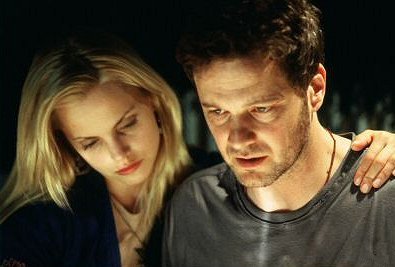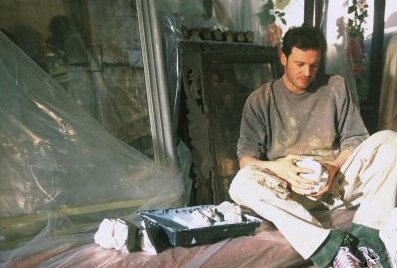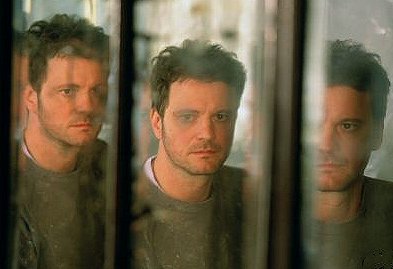Attempting to restart his shattered life, he moves home and is befriended by beautiful New Age neighbour Charlotte (American Beauty's Mena Suvari). His life may finally be turning around but all is not what it seems and, haunted by ghostly visions, Ben starts losing his tenuous grip on reality and enters a vortex of psychological confusion. The police think he might even have something do to with the strange death of Paris...if only he could separate the truth from the dark hallucinations in his tortured mind. Interesting Journey My Little Eye was Evans's narrative exercise in using the camera objectively. Now he's totally reversed that experiment to tell the Trauma story from a completely subjective point of view meaning Firth is in every single frame of the movie except for the shocking denouement. And that's one of the reasons why the Shakespeare in Love actor wanted to be in the picture. He said, "Marc and I go back a long way. We worked on the Ruth Rendell TV movie Master of the Moor in 1994 and I thought he was brilliant. So I wanted to work with him again but our numerous attempts never quite panned out. Then Trauma came out of left-field and intrigued me enough to join him on what was clearly going to be an interesting journey. My main motivation for doing anything these days is to work with people I have always wanted to collaborate with and this seemed the perfect opportunity for Marc and I to get together." He continued, "While Trauma may seem a departure from what I'm now known for, it isn't really. I was appearing in quirky features like Tumbledown about the horrors of war, and Apartment Zero abou the human psyche's dark side, way before I took on Darcy in Pride and Prejudice. And everyone thought that was a departure at the time and that I couldn't possibly play a romantic lead. I flew in the face of extraordinary resistance with Darcy. So I feel I'm going back to my roots somewhat with Trauma, essaying the sort of roles that were my territory in the early days." Firth is relaxing between takes as we speak. The scene being shot has his character unknowingly becoming involved in a TV reconstruction of Paris's death. As the fictional director of the reconstruction video adjusts the lighting, and every extra is told to stay motionless until Action is called, Ben wanders through what is essentially a life-size freeze-frame. This strange sequence is another clue to the multi-levelled surreal versus real cleverness that Evans, with his director of photography, Gladiator BAFTA winner John Mathieson, is uniquely fusing together. Firth said, "You're confused! I've had to constantly be reminded by Marc where I am in the story at any given time. Because Trauma is being done from the perspective of looking out from inside Ben's head, in order for me to understand how I relate, I've got to know what he's going to show the audience as I don't see much with the naked eye. I also have to know if the scene is being over-cranked or under-cranked so I know how to modulate my performance because much of it is reliant on post-production editing and sound. I sometimes see John putting a weird lens on the camera and I have to know what it's going to do or else I might end up doing something totally inconsistent with the way I'm being photographed. All the visual trickery is being done in-camera, which is a relief as I'm not one of those actors who could tolerate dangling from wires in front of a green screen having to react to nothing." Intricate Inspirations  Because of the intricate way Evans is
shooting Trauma, Firth is
happy they know each other well enough to convey in shorthand what both
require. Firth continued, "I get fired up by Marc's ideas and we have
the ideal exchange relationship. That way we can both get inspired
without being devout to the text. Marc is not shy of the generic
aspects of Trauma and wants
to quote from other movies too. His main inspirations come from
Krzysztof Kieslowski's Three Colors:
Red, White and Blue,
Nic Roeg's Don't Look Now and
Roman Polanski's Repulsion
and The Tenant. I'm probably
doing Marc a great disservice by naming them, but it does give you a
rough idea of the psychological zone we're in. The moment I read
'cracks suddenly appear in the wall', I did think of Repulsion, which like Apartment Zero also deals with a
lonely person in a big city flat. Ben's flat is a converted hospital
ward, which adds further resonance to the multi-faceted plot. And I
haven't even mentioned being covered in ants for some scenes! — that's another significant symbol in
the overall scheme of things." Because of the intricate way Evans is
shooting Trauma, Firth is
happy they know each other well enough to convey in shorthand what both
require. Firth continued, "I get fired up by Marc's ideas and we have
the ideal exchange relationship. That way we can both get inspired
without being devout to the text. Marc is not shy of the generic
aspects of Trauma and wants
to quote from other movies too. His main inspirations come from
Krzysztof Kieslowski's Three Colors:
Red, White and Blue,
Nic Roeg's Don't Look Now and
Roman Polanski's Repulsion
and The Tenant. I'm probably
doing Marc a great disservice by naming them, but it does give you a
rough idea of the psychological zone we're in. The moment I read
'cracks suddenly appear in the wall', I did think of Repulsion, which like Apartment Zero also deals with a
lonely person in a big city flat. Ben's flat is a converted hospital
ward, which adds further resonance to the multi-faceted plot. And I
haven't even mentioned being covered in ants for some scenes! — that's another significant symbol in
the overall scheme of things."Loneliness is Madness He added, "Some people think we're making a more Fantasy-orientated version of David Cronenberg's Spider. But, as Marc is fond of saying, you knew Ralph Fiennes' character in that was mad from the beginning. Here that might not be the case. An extreme form of loneliness is madness and there's also the addition of the rock diva sub-plot. The reason why Lauren is significant is because it's a bit like someone close to you dying on the same day as, say, Princess Diana. You are grief-stricken but everyone else is too. It's so hard to care about your very personal loss. That's why I get confused between my dead wife and Lauren and, although I do recall knowing Lauren for reasons I dare not divulge, I can't remember if I'm involved in her murder." Firth decided not to research compulsive obsessive behavior because, "I wanted the muddled and unsettling Trauma imagery to be specific to Ben's experiences as he undergoes them. I didn't want to get into imitating other people's diagnosed states. Ben is obviously psychologically distraught but we're viewing his world as if he's sane. Someone once described delusional madness as being a normal reaction to an extraordinary thing. Trauma shows everything Ben sees from his own personal reality perspective and by the end of the movie we've hopefully taken everyone to a similar extreme threshold. The things he does witness are often at the behest of the people around him who could be either imaginary or palpably real. So he might also be being self-manipulated by these figments that are purely extensions of himself." Challenging Role  Clearly it's
been a hard role for Firth to play but he's absolutely loved the
challenge involved. He said, "It's has been difficult to strike a
balance between being overly obtuse and cryptic to being boringly
prosaic and explanatory. We don't want to frustrate the audience by
being too baffling but we still have to retain the necessary air of mystery. And often too much explanation can
be a let down. 'Oh, is that all it was about?' As a result we have cut
some scenes that were too confusing and others that give the game away
too early. I thought it might make sense to film two versions of some
scenes just in case but we haven't the time or budget for such a
luxury."
Clearly it's
been a hard role for Firth to play but he's absolutely loved the
challenge involved. He said, "It's has been difficult to strike a
balance between being overly obtuse and cryptic to being boringly
prosaic and explanatory. We don't want to frustrate the audience by
being too baffling but we still have to retain the necessary air of mystery. And often too much explanation can
be a let down. 'Oh, is that all it was about?' As a result we have cut
some scenes that were too confusing and others that give the game away
too early. I thought it might make sense to film two versions of some
scenes just in case but we haven't the time or budget for such a
luxury."He added, "The best I can hope for with Trauma is that people won't be expecting this type of character from me. I wanted to play Ben because there was no familiarity about him in relation to my past work. And that was a blessed relief after my run of romantic comedies. And as it is my first true blue Horror film, I wanted Ben to be someone you haven't recognized before. It may surprise people to learn that I've watched a lot of Horror movies and what struck me about them is how difficult it is for an actor to play permutations of being permanently horrified. Walking along dark corridors, running to safety from a maniac, jumping at eerie sounds, most of the time that's all they are doing. That isn't what Trauma is about. It's more about reacting to the shifting psychological moods created by an adept director. And if you have faith, like I implicitly do in Marc, the horror is organic and even scarier because it's based on the door to your subconscious mind that should be shut. In Ben's case that door has suddenly become slightly ajar." |
